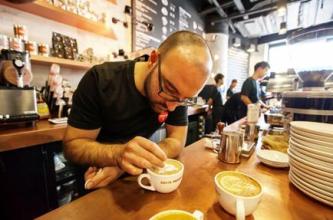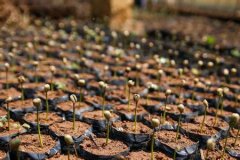A brief introduction to the Market Price of simple and mild Uganda Fine Coffee Bean varieties

Mbale on the eastern side of Mount Elgon and other producing areas on the western side near the border of the Democratic Republic of the Congo have the export name Wugar. The official ranks are Oaganic (Organic), Bugisu AA, Bugisu A, Bugisu B, Bugisu PB, Wugar, Drugar and other unlisted grades. To find a good Ugandan coffee, you must first recognize the BugisuAA, An and PB grades, but because the country is inland and has many transport problems, it often comes to raw beans with low moisture content and not green appearance. However, Ugandan coffee is not a type of coffee that emphasizes rising aroma, as long as the raw beans are not and turn 100 or yellowed, they can generally have a good flavor in the producing area, with a low ripe fruit aroma, such as the taste of red wine, and thick mellow thickness. it is similar to some Kenyan beans with low flavor, but it also has a mild soil flavor, so it is quite different from other East African countries in flavor characteristics. On the contrary, it is somewhat similar to Asian Indonesian Sulawesi Tonaga coffee and Java manor coffee. The baking degree between City+ and Full City+ is all better.
Ugandan coffee beans have a unique flavor of delicate taste, which is very suitable for making Italian and other flavors of coffee. More importantly, Ugandan coffee beans are strictly screened according to the standards of the international market to ensure their high quality and pollution-free characteristics.
Africa is the hometown of the two major varieties of coffee, Arabica and Robusta, while Uganda, which is located in eastern Africa, which is known as "plateau water hometown" and "Pearl of East Africa", is believed by many to be the birthplace of Robusta.
Coffee is the first product to be labeled "Fair Trade", and coffee farmers get real benefits from it. Chilean FLO producers sold coffee beans last year for $1.26 a pound, compared with 47.35 cents a pound on the New York futures market. However, FLO does not buy products directly, but mobilizes big companies to join by promoting the "Fairtrade" logo. Fair Trade has held several promotional events in front of Starbucks coffee shops, and members of FLO held pictures of coffee farmers working hard to tell coffee drinkers that "a coffee farmer who works hard to sell a kilogram of coffee beans earns much less than our coffee shop earns a cup of Italian coffee." Members of FLO also put up slogans saying, "taste the taste of fairness" to introduce coffee with the "Fairtrade" logo to consumers. Many people immediately left Starbucks to buy Fairtrade coffee and take it away. Simon, head of products at FLO in France, once said, "if consumers understand that every bag of Fairtrade coffee they buy is helping a coffee grower, I think many consumers will not hesitate to spend a little more money." Under this publicity campaign, Starbucks has also joined the Fairtrade campaign, buying products from qualified producers at the purchase price set by FLO every year, selling them in stores with the "Fairtrade" logo after processing, and paying fees for the use of the logo to FLO. )
Quality grades of Ugandan coffee:
Bugisu Bugisu AA (only 4% of total national output)
Bugisu Bugisu A
Vago Wugar A (all of the above belong to washing treatment)
And a small amount of sun beans.
Zhuge Drugar
Bugisu Bugisu AA
AA represents the grade of coffee and represents the highest grade in the country.
Bugisu Bugisu grows on the slopes of Mt.Elgon in eastern Uganda. The palate is thick and low in acidity, with a unique taste of raw papaya, which is very different from other East African coffee and is closer to Indonesian Java coffee.
Ugandan coffee beans have a unique flavor of delicate flavor, which is very suitable for making Italian and other flavors of coffee. More importantly, Ugandan coffee beans are strictly screened according to the standards of the international market to ensure their high quality and pollution-free characteristics.
Uganda is a landlocked country in eastern Africa, across the equator, most of the territory is located in the Central African Plateau, lakes, with an average elevation of 1,000,000m above sea level, with many lakes and plateaus in the mountains, known as "plateau water villages". The western branch of the East African Rift Valley runs through the western border, with many rivers and lakes at the bottom of the valley. Uganda has a great Victoria lake, coupled with the high mountains, which makes Uganda a mild climate suitable for growing coffee, although it spans both sides of the equator.
The coffee growing industry in Uganda is one of the pillar industries of its exports. Uganda is the birthplace of Robsta in Africa, just as Ethiopia is the origin of Arabica coffee, while Robster coffee was first discovered in Uganda. So far, Uganda has a history of growing coffee for more than 100 years. At the same time, Uganda is one of the few major countries in Africa dedicated to the production of organic coffee. In Uganda (Uganda), Arabica coffee beans account for only 15% of the country's total coffee production, and Uganda's best coffee is mainly produced in the mountains of Elgon and Bugisu along the Kenyan border in the north-east and Ruwensori in the west.
Important Notice :
前街咖啡 FrontStreet Coffee has moved to new addredd:
FrontStreet Coffee Address: 315,Donghua East Road,GuangZhou
Tel:020 38364473
- Prev

A brief introduction to the history and culture of the origin and development of Ugandan boutique coffee with mild and simple taste
Mbale on the eastern side of Mount Elgon and other producing areas on the western side near the border of the Democratic Republic of the Congo have the export name Wugar. The official ranks are Oaganic (Organic), Bugisu AA, Bugisu A, Bugisu B, Bugisu PB, Wugar, Drugar and other unlisted grades. To find a good Ugandan coffee, you must first recognize BugisuAA and A.
- Next

A brief introduction to the cultivation of nutty boutique coffee in Uganda, geographical location, climate and altitude
Beans are grown in Java, Sulawesi and New Guinea in Indonesia, and soybeans are also well washed in the IJEN highlands in eastern Java. Uganda coffee cultivation is one of the pillar industries of its exports. Uganda is the birthplace of Robsta in Africa, just as Ethiopia is the origin of Arabica coffee, and Robster coffee was first found in Uganda. So far, Uganda has more than
Related
- Detailed explanation of Jadeite planting Land in Panamanian Jadeite Manor introduction to the grading system of Jadeite competitive bidding, Red bid, Green bid and Rose Summer
- Story of Coffee planting in Brenka region of Costa Rica Stonehenge Manor anaerobic heavy honey treatment of flavor mouth
- What's on the barrel of Blue Mountain Coffee beans?
- Can American coffee also pull flowers? How to use hot American style to pull out a good-looking pattern?
- Can you make a cold extract with coffee beans? What is the right proportion for cold-extracted coffee formula?
- Indonesian PWN Gold Mandrine Coffee Origin Features Flavor How to Chong? Mandolin coffee is American.
- A brief introduction to the flavor characteristics of Brazilian yellow bourbon coffee beans
- What is the effect of different water quality on the flavor of cold-extracted coffee? What kind of water is best for brewing coffee?
- Why do you think of Rose Summer whenever you mention Panamanian coffee?
- Introduction to the characteristics of authentic blue mountain coffee bean producing areas? What is the CIB Coffee Authority in Jamaica?

